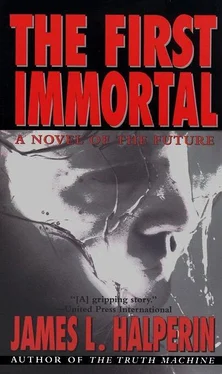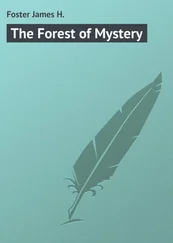“Just my salary. Nobody here gets a commission. We’re nonprofit.”
“Really?”
“Yes, sir.” Again Perez’s tone conveyed the eloquence of truth.
“Back in World War Two,” Ben said, “the Army used to have a serious problem with parachutes. About one percent of ‘em failed to open. Now one percent doesn’t sound like much, unless you happen to be one of the unlucky fellas who got the wrong ones. But they finally solved the problem; got the defect rate down to zero.”
“How?” Perez asked.
“Simple. They made all the parachute packers and inspectors take monthly jumps, using parachutes selected at random from those they’d worked on themselves.”
“Exactly! And our basic philosophy is very similar to theirs. What we do here is for our own benefit as much as yours. Maybe we’re a little more trusting than the Army, but not much. Remember how I told you I’m one of the fifty-six people signed up?”
“So you did.”
“In fact, the Phoenix won’t hire anyone who doesn’t plan to take the exact same journey our members sign up for. What’s more, I make about a third as much here as I did at my last job selling real estate. I work here because I want to help assure my own journey into the future, and my family’s, too.”
“Well, that’s somewhat reassuring. And you refer to your organization as the Phoenix?” Ben added. “Of Phoenix, Arizona. Was your location an accident, or intentional?”
Perez laughed. “We chose Phoenix because it’s one of the least likely places in the United States to have an earthquake, or any other natural disaster for that matter. Purely a coincidence, but an interesting one, don’t you think?”
“Very.
“Of course, once we decided to locate here, it seemed so perfect to refer to ourselves as ‘the Phoenix.’”
“A fitting name,” Ben allowed, picturing the great bird rising from the ashes.
“I tend to think of us as a lifeboat to the future,” Perez replied, a metaphor Ben appreciated more than the man could have realized. “But whatever image works best for you. If you’d like to learn more, I’ll be happy to send you our information package.”
A leaky lifeboat to the future may be lunacy, Ben decided, but feeding his body to the fauna was even crazier. He gave Perez his address.
January 1, 1983
Alone on New Year’s Day, Ben finally found time to catch up on his paperwork, but first he dialed Gary’s number. He now spoke with his son about once a week. Gary’s work had become a focus in Ben’s life; attending exhibitions and reading catalogs to learn as much as possible about his son’s art. They couldn’t be said to be at ease with each other, but now their contact often seemed to lack the anticipation of pain and discomfort. It was a start.
Ben recalled their conversation of four days ago when Gary had actually sounded pleased to hear from him. Maybe so, Ben now thought, but they were still strangers, weren’t they? Or no—Gary’s resentment made them too intimate to be strangers, yet they certainly didn’t know each other. Perhaps they never would.
Ben knew he would continue to make the effort. Relentlessly.
There was no answer. Damn! Gary hadn’t bothered to reset his answering machine again. He’d have to try later.
Ben looked at his cluttered desktop and noticed the nine-by-twelve-inch envelope received six weeks earlier from the Phoenix Life Extension Foundation. Since its arrival, it had languished unopened.
Wasn’t procrastination such a human response to the anticipation of death? Who wanted to confront one’s own mortality? He also knew that few people spent enough time arranging their estates or preparing their wills; these were not comfortable activities. He’d seen it in his patients time and again. In fact hadn’t his own response to his first heart attack also been procrastination, borne by denial? He sure as hell wouldn’t make that mistake again.
He opened the package.
A few minutes became three hours as Ben pored over the history of cryonics in the United States and the philosophy of those who ran the Phoenix. Cryonics still made him nervous, but the literature appealed to Ben’s optimistic nature and seemed not to conflict with scientific realism.
Every doctor knew that nerve cells passing messages within the brain allowed a person to see, feel, and think; a delicate system that could not function without constant nourishment from the bloodstream. If a heart attack or other trauma interrupted the flow of these crucial nutrients, enough cells would perish within ten minutes to render the brain nonviable. At extremely low temperatures, however, this grace period might be extended for centuries. By some estimates, the temperature of liquid nitrogen could slow cellular erosion to less than a trillionth of its decay rate at normal temperatures.
It seemed a virtual certainty that thoughts and dreams, indeed all neuronal activity, would cease during suspension. To Ben, that premise alone was of considerable comfort.
At any temperature below the freezing point of water, however, too many cell membranes would be damaged by ice crystals. Modern technology could not hope to reverse this damage, but someday, many scientists believed, doctors might have the means to repair individual cells and even DNA strands. At that point, perhaps suspended patients could be successfully revived and restored to full health; even to youthful vigor.
Embryos, seeds, and simple organisms had already been frozen for years or centuries, then brought back to life. Dogs had been cooled to about 36 degrees Fahrenheit, maintained in a lifeless state for several hours, and revived to apparent normalcy. But no mammal had ever been suspended in liquid nitrogen as “cryonauts” were, and revived years, or even minutes, later. Damage from the freezing process itself was far too extensive for current medical science to reverse; indeed, such damage was often millions of times more pervasive than the original cause of death.
There were legal problems, too. Amazingly, all these appeared to be fully disclosed in the literature. The Phoenix had been both plaintiff and defendant in numerous lawsuits against individuals and government agencies. Many of these lawsuits were presented in excruciating minutiae, almost as a badge of honor.
No laws had been written with cryonics in mind, and thus regulatory and bureaucratic entanglements were common. Another obvious problem was that no cryonic procedure could begin until a patient had been pronounced legally dead. Often hospitals and other medical authorities refused cooperation. Some even interfered with the Phoenix during such emergencies.
An interesting case described by one wealthy member pertained to his Siamese cat. The animal, having been diagnosed with terminal brain cancer, had been immediately anesthetized, flown to Phoenix, treated, and frozen alive. The entire procedure was described with scientific precision. This feline received what could only have been considered as ideal treatment.
“The irony,” the cat’s owner had written, “is that no terminal human being subjugated to today’s laws could ever expect suspension under such perfect conditions. For example, if I had a similar brain cancer, before I could be frozen I would have to wait until the tumors had sufficiently ravaged my brain to cause death, rendering my prospects for identity-preservation extremely doubtful.”
There was also a financial statement in the packet. The Phoenix was not particularly well-funded, and decidedly stingy in employee compensation. David Perez’s gross salary was only $13,000 per year, and the president of the organization, Dr. Alyson Shockley, earned barely double that amount. Evidently they were not in it for the money.
Читать дальше












